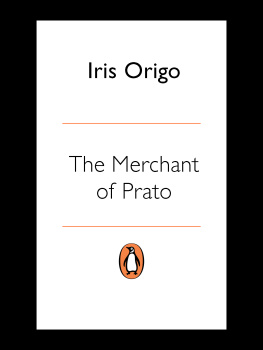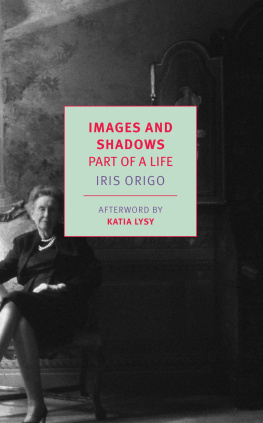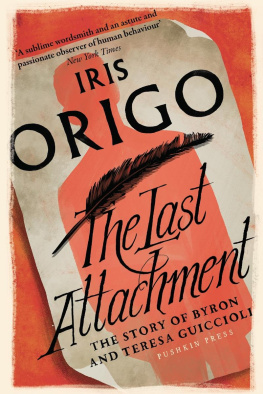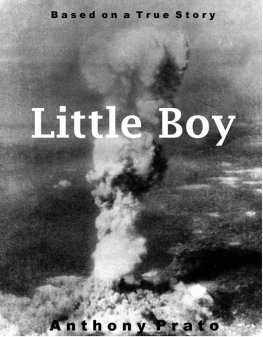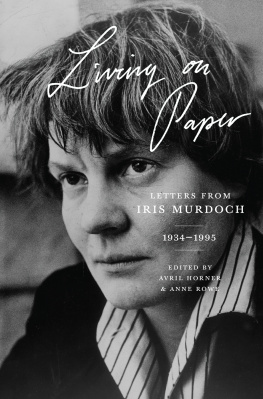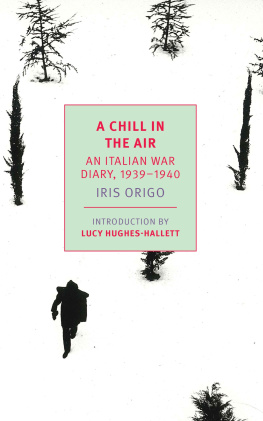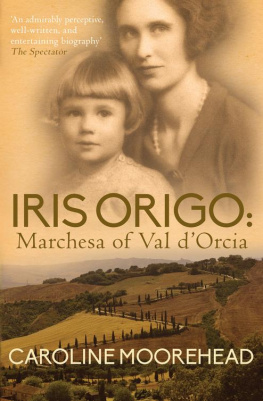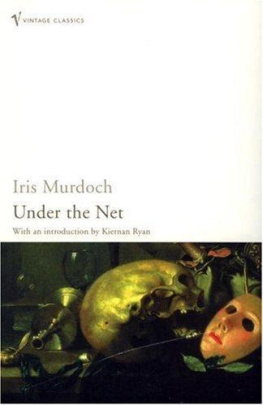Iris Origo - The Merchant of Prato
Here you can read online Iris Origo - The Merchant of Prato full text of the book (entire story) in english for free. Download pdf and epub, get meaning, cover and reviews about this ebook. year: 2017, publisher: Penguin Books Ltd, genre: Non-fiction. Description of the work, (preface) as well as reviews are available. Best literature library LitArk.com created for fans of good reading and offers a wide selection of genres:
Romance novel
Science fiction
Adventure
Detective
Science
History
Home and family
Prose
Art
Politics
Computer
Non-fiction
Religion
Business
Children
Humor
Choose a favorite category and find really read worthwhile books. Enjoy immersion in the world of imagination, feel the emotions of the characters or learn something new for yourself, make an fascinating discovery.
- Book:The Merchant of Prato
- Author:
- Publisher:Penguin Books Ltd
- Genre:
- Year:2017
- Rating:5 / 5
- Favourites:Add to favourites
- Your mark:
- 100
- 1
- 2
- 3
- 4
- 5
The Merchant of Prato: summary, description and annotation
We offer to read an annotation, description, summary or preface (depends on what the author of the book "The Merchant of Prato" wrote himself). If you haven't found the necessary information about the book — write in the comments, we will try to find it.
The Merchant of Prato — read online for free the complete book (whole text) full work
Below is the text of the book, divided by pages. System saving the place of the last page read, allows you to conveniently read the book "The Merchant of Prato" online for free, without having to search again every time where you left off. Put a bookmark, and you can go to the page where you finished reading at any time.
Font size:
Interval:
Bookmark:



UK | USA | Canada | Ireland | Australia
India | New Zealand | South Africa
Penguin Classics is part of the Penguin Random House group of companies whose addresses can be found at global.penguinrandomhouse.com.

First published by Jonathan Cape 1957
Published in Peregrine Books 1963
Published in Penguin Books 1992
First published in Penguin Classics 2017
Copyright Iris Origo 1957, 1963
ISBN: 978-0-241-30381-8
Iris Origo, the Marchesa Origo (19021988), was an American writer who lived in Southern Tuscany. Her other books include War in the Val dOrcia, Leopardi and The Last Attachment.

discover more stories like this at Penguin.co.uk
Lhistorien ressemble logre de la fable. L o il flaire la chair humaine, il sait que l est son gibier.
BLOCH: Mtier dhistorien
In the square of the busy little city of Prato, beneath the faded brick walls of the Palazzo Comunale in which he sat as a councillor, stands the statue of a merchant. Clothed in the round biretta and sweeping robes of the fourteenth century, he holds in his hand a sheaf of bills of exchange. This is the man to whom Prato owes the foundation of her riches: Francesco di Marco Datini.
The story of the rise of his trading houses in Avignon, Prato, and Florence, in Pisa and Genoa, in Spain and Majorca, is as remarkable as the success-story of a modern millionaire, and quite as fully recorded. His fellow-citizens, to this day, pride themselves on it and dwell above all on the charity which he bequeathed to the poor of Prato, not only his whole fortune of 70,000 gold florins, but the very house in which he lived, and in it, his greatest gift to posterity, his papers. During his lifetime he himself collected every letter and business document he received, telling the managers of all his branches to do the same, and in his will he left instructions for all these papers to be collected and preserved in his own house.
These instructions were carried out somewhat carelessly, for although there is a record in 1560 that Francesco di Marcos ledgers and papers had been carefully put away in cupboards in his own house, they were found 300 years later in sacks in a dusty recess under the stairs. But in the long run this neglect may not prove to have been entirely unfortunate. Bene qui latuit, bene vixit. A few of these pages were nibbled by mice or worms; but at least thieves and fools remained unaware of their existence and when, in 1870, some learned citizens of Prato brought them to light, an astonishing number still remained: some five hundred ledgers and account-books, about three hundred deeds of partnership (some of them belonging to other small companies, connected with his own), insurance policies and bills of lading, bills of exchange and cheques and, above all, some 140 thousand letters, of which eleven thousand belong to his private correspondence, and the rest, in 503 files, to the various aspects of his commercial activity. Thus has been preserved, in the very house of the man whose life-work it represented, an invaluable, and indeed, in its fullness and homogeneity, a unique record of medieval trade.
The picture of commercial activity which these letters present is very remarkable. When Datini returned to Italy from Avignon, in 1382, his branch in that city (entrusted to two Tuscan partners) continued to be as active as before; and he at once opened a central house in Prato, and soon after branches in Florence, Pisa, and Genoa, in Barcelona and Valencia, and finally in Majorca and Ibiza, all managed by his own partners or fattori on the spot, but controlled by his own untiring pen. Between these fondaci sailed the ships which carried his wares: lead and alum and pilgrims robes from Roumania, slaves and spices from the Black Sea, English wool from London and Southampton and African or Spanish wool from Majorca and Spain, salt from Ibiza, silk from Venice, leather from Cordova and Tunis, wheat from Sardinia and Sicily, oranges and dates and bark and wine from Catalonia . Small wonder that Francescos fellow-citizens gaped, as the great bales came pouring in, and whispered that he was the greatest merchant who ever came out of Prato!
Some of the business documents in these archives have already formed the subject of special monographs; others (especially those concerning deeds of partnership, bills of exchange, bills of lading, insurance policies and other contracts) have been fully studied and described in Professor Bensas full-length study of Datini and his trade. And owing to the research and enterprise of Professor Federigo Melis an exhibition opened in May 1955, in the Palazzo Pretorio of Prato, the Mostra dell Archivio Datini, enabled the general public to see, for the first time, not only a selection of these papers, but much additional material: portraits of some of Datinis contemporaries and pictures of the setting in which they lived, maps showing his main trading-routes by land and sea, pictures of the places from which his merchandise came, and in a room given up to the cloth industry of Prato charts and account-books and letters showing the whole complicated organization of a medieval cloth manufacturer, from the first purchase of the imported wool in Majorca, Catalonia, or the Cotswolds, through all the stages of spinning, weaving, dyeing, and finishing, until the cloth was sent abroad again for sale.
These studies, however, have dealt chiefly with Datinis trade. Except for the delightful letters written to him by his friend and notary, Ser Lapo Mazzei, which were published by Cesare Guasti in 1880, his private correspondence has remained almost untouched in particular, the letters he exchanged with his wife, his partners and his fattori. It is from these letters that most of the information in this book is derived although indeed even now these sources are far from being exhausted, or even fully tapped. This book is merely an attempt to draw, from this vast and miscellaneous material, a picture (even if fragmentary and incomplete) of the daily life of the time, and a portrait of the merchant himself, of his wife, his friends, and his underlings.
The flavour of these letters is completely consistent: in the vision of life they represent, only two things have any importance religion and trade. On the first page of Datinis great ledgers stood the words, In the name of God and of profit, and these were the only goals to which these merchants aspired: profit in this world or in the next, as if the whole of life were one vast counting-house and at its end, the final Day of Accounting. Many of the chief events of the time have found their way into these papers but the peep-hole through which they are observed is always the merchants, on the look-out for a good deal. A new Popes election a truce with the Duke of Milan, an approaching famine, a treaty between Christians and Turks, a royal wedding are all merely grist to his unresting mill.
Font size:
Interval:
Bookmark:
Similar books «The Merchant of Prato»
Look at similar books to The Merchant of Prato. We have selected literature similar in name and meaning in the hope of providing readers with more options to find new, interesting, not yet read works.
Discussion, reviews of the book The Merchant of Prato and just readers' own opinions. Leave your comments, write what you think about the work, its meaning or the main characters. Specify what exactly you liked and what you didn't like, and why you think so.

